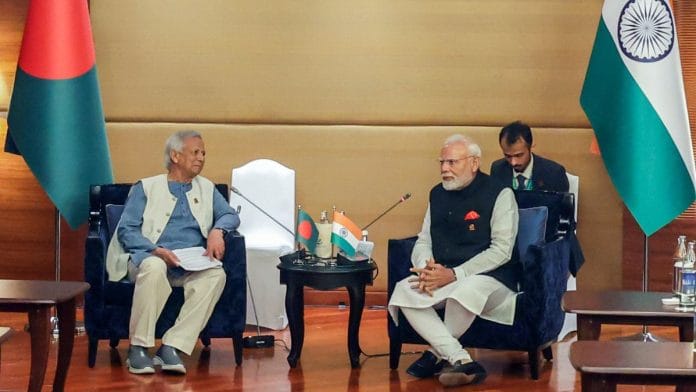Bangkok: Prime Minister Narendra Modi called on Bangladesh to ensure perpetrators of atrocities against Hindus and minorities are brought to justice in the country, raising the issue of their safety and welfare during his first bilateral meeting with Chief Adviser Muhammad Yunus Friday.
Modi also urged Yunus and the interim government to avoid any rhetoric that “vitiates” the atmosphere between the two countries during the meeting, Foreign Secretary Vikram Misri said during a special briefing in Bangkok.
The meeting between the two leaders, reported by ThePrint Thursday, took place on the margins of the 6th BIMSTEC summit in the Thai capital amid growing tensions between Dhaka and New Delhi since the ouster of Sheikh Hasina’s government last year.
The meeting between the two leaders lasted about 45 minutes. A person familiar with the matter told ThePrint that PM Modi’s focus during the meeting was to raise the issue of the safety of minorities in Bangladesh and to push Yunus to allow the current mechanisms within the two countries to continue to operate as well as ensure the enforcement of border security according to law.
According to Misri, “The Prime Minister also underlined India’s concerns related to the safety and security of minorities in Bangladesh, including Hindus, and expressed his expectation that the government of Bangladesh would ensure their security including by thoroughly investigating all cases of atrocities committed against them.”
“On the border—strict enforcement of the law and the prevention of illegal border crossings, especially at night, is essential for maintaining border security and stability.”
PM Modi also told Yunus “that any rhetoric that vitiates the environment is best avoided” and reiterated “India’s support for a democratic, stable, peaceful, progressive and inclusive Bangladesh”, said Misri.
Also Read: India-Thailand reset ties amid Trump’s tariffs, elevate relations to ‘strategic partnership’
Bangladesh raises Hasina’s extradition
While Yunus and Modi spoke over the phone last year, this was the first time the two leaders met in person. Reports said Bangladesh had earlier requested the meeting on the sidelines of regional summit.
It comes days after Yunus completed his first foreign trip, skipping the tradition of visiting India with a trip to China.
There, he told Chinese officials at an event that Bangladesh was the “only guardian” of the ocean in the region, saying India’s Northeast was “landlocked”. He also urged Beijing to view Bangladesh as an extension of the Chinese economy. The issue snowballed into a political controversy, with a number of political leaders from the Northeast hitting back at Yunus.
Ties between the two neighbouring countries have been fraught over the last eight months since Hasina was ousted in massive anti-government protests and fled to India in August last year.
After the meeting of the two leaders, Shafiqul Alam, the press secretary to Yunus, said that the chief adviser raised the issue of Hasina’s extradition to Bangladesh with Modi. For Dhaka, Hasina’s continued stay in New Delhi has been a major irritant to the relationship.
In December 2024, India acknowledged it had received a request to the effect and was examining it in accordance with the requirements of the extradition treaty between the two countries. Hasina’s “incendiary” rhetoric from New Delhi has been a continued issue for Yunus, who has claimed that outside forces are attempting to “destabilise” Bangladesh.
India has also raised the issue of reports of attacks on minorities in Bangladesh, particularly Hindus. While Dhaka initially rejected the reports as “exaggeration”, authorities have since confirmed that it is investigating over 2,000 reported incidents of crimes against Hindus and other minorities.
During the bilateral meeting, the two leaders also discussed the renewal of the Ganges Water Treaty, set to expire in December 2026, as well as the Teesta river sharing dispute.
(Edited by Sanya Mathur)
Also Read: An unassuming summit in an Asian megapolis—a view of the BIMSTEC summit from the ground






